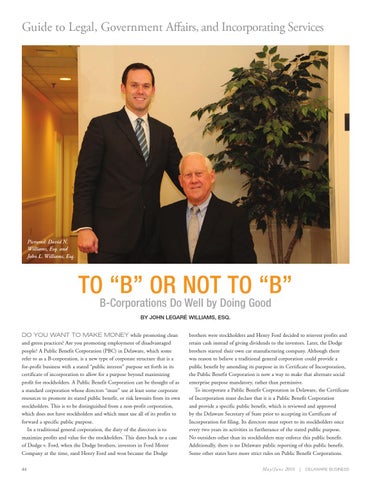Guide to Legal, Government Affairs, and Incorporating Services
Pictured: David N. Williams, Esq. and John L. Williams, Esq.
TO “B” OR NOT TO “B” B-Corporations Do Well by Doing Good BY JOHN LEGARÉ WILLIAMS, ESQ.
DO YOU WANT TO MAKE MONEY while promoting clean and green practices? Are you promoting employment of disadvantaged people? A Public Benefit Corporation (PBC) in Delaware, which some refer to as a B-corporation, is a new type of corporate structure that is a for-profit business with a stated “public interest” purpose set forth in its certificate of incorporation to allow for a purpose beyond maximizing profit for stockholders. A Public Benefit Corporation can be thought of as a standard corporation whose directors “must” use at least some corporate resources to promote its stated public benefit, or risk lawsuits from its own stockholders. This is to be distinguished from a non-profit corporation, which does not have stockholders and which must use all of its profits to forward a specific public purpose. In a traditional general corporation, the duty of the directors is to maximize profits and value for the stockholders. This dates back to a case of Dodge v. Ford, when the Dodge brothers, investors in Ford Motor Company at the time, sued Henry Ford and won because the Dodge 44
brothers were stockholders and Henry Ford decided to reinvest profits and retain cash instead of giving dividends to the investors. Later, the Dodge brothers started their own car manufacturing company. Although there was reason to believe a traditional general corporation could provide a public benefit by amending its purpose in its Certificate of Incorporation, the Public Benefit Corporation is now a way to make that alternate social enterprise purpose mandatory, rather than permissive. To incorporate a Public Benefit Corporation in Delaware, the Certificate of Incorporation must declare that it is a Public Benefit Corporation and provide a specific public benefit, which is reviewed and approved by the Delaware Secretary of State prior to accepting its Certificate of Incorporation for filing. Its directors must report to its stockholders once every two years its activities in furtherance of the stated public purpose. No outsiders other than its stockholders may enforce this public benefit. Additionally, there is no Delaware public reporting of this public benefit. Some other states have more strict rules on Public Benefit Corporations. May / Jun e 2016 | DELAWARE BUSINESS
